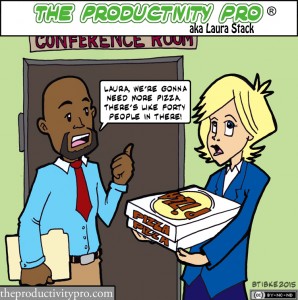 Back in the 1890s, French researcher Max Ringelmann discovered what others later called the Ringelmann effect[1]: The larger a workgroup, the more likely workers will waste time rather than get their work done. Not only do they socialize more, they also expect others to pick up the slack. This remains true today: small workgroups tend to produce more per person than larger ones.
Back in the 1890s, French researcher Max Ringelmann discovered what others later called the Ringelmann effect[1]: The larger a workgroup, the more likely workers will waste time rather than get their work done. Not only do they socialize more, they also expect others to pick up the slack. This remains true today: small workgroups tend to produce more per person than larger ones.
Many entrepreneurs have taken this to heart, including Jeff Bezos of Amazon.com. According to his “Two-Pizza Rule“, a team or meeting should contain no more people than it would take to feed with two large pizzas. Bezos sets the number at 5-8. Why so few? Partially because the more channels of communication involved, the greater the likelihood for confusion.
To answer the title question, clearly there are situations where teamwork can damage productivity. Indeed, some have challenged the entire assumption that teamwork is inherently productive.[2] Researchers Natalie Allen and Tracy Hecht (a psychologist and management professor, respectively) claim there’s little research to prove it—that we accept it as real because it makes sense, just as many of us still believe failure inevitably precedes entrepreneurial success.[3] Among other things, Allen and Hecht claim we often force teamwork on projects and people who don’t need it.
Consider brainstorming. Contrary to expectations, it seems to work best when individuals do it in private and then compare ideas. In group settings, introverts are less likely to speak up, while extroverts may take over the whole session.
Which brings us to groupthink. When one person dominates a group, especially when they’re aggressive or threatening, everyone may agree with them just so they can stay on the alpha member’s good side and get along. This inevitably damages productivity as ideas and innovation go stale.
Angel’s Advocate
I’m not saying teamwork is passé; far from it. I love and respect teamwork, because no one does everything perfectly or even well; nor can one person handle all aspects of most projects. In great teams, the workers slot together like a well-oiled machine. But the fact is, teamwork doesn’t work for everything—a factor that good team leaders and their teammates alike have to take into account. Similarly, teamwork can go wrong if you don’t take into account individual capacities for productivity, creativity, and innovation. So while teamwork rules, it doesn’t rule all. Know when to put it aside for the moment.
© 2015 Laura Stack. Laura Stack, a.k.a. The Productivity Pro®, helps professionals achieve Maximum Results in Minimum Time®. For over 20 years, her keynote speeches and workshops have helped leaders boost personal and team productivity, increase results, and save time at work. Laura is the author six books, most recently Execution IS the Strategy. Widely regarded as one of the leading experts in the field of performance and workplace issues, Laura has been featured in the Wall Street Journal, the New York Times, and USA Today. Connect via her website, Facebook, or Twitter.
[1] Kravitz, D.A. and Martin, B. (1986). “Ringelmann rediscovered: The original article,” Journal of Personality and Social Psychology, vol. 50, pages 936-941.
[2] Allen, N. J. and Hecht, T. D. (2004), The ‘romance of teams’: Toward an understanding of its psychological underpinnings and implications. Journal of Occupational and Organizational Psychology, 77: 439–461. doi: 10.1348/0963179042596469
[3] Gompers, Paul A., Josh Lerner, David Scharfstein, and Anna Kovner (2010). “Performance Persistence in Entrepreneurship.” Journal of Financial Economics 96: 18-32.


